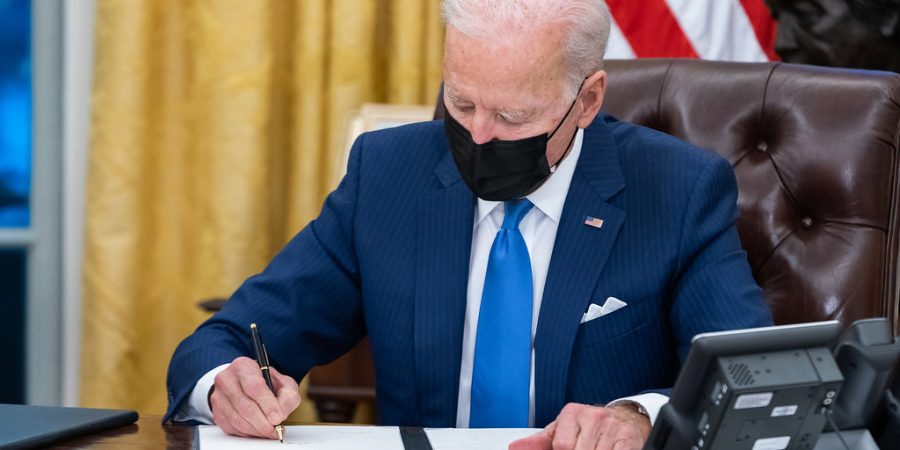“faith-based groups that work with refugees are concerned about the impact of that delay...”
Canceled flights, expired clearances: US refugee resettlement in limbo awaiting promised changes

Part of that work was to include raising the number of refugees allowed into the United States from 15,000, a historic low set by the former president, to 125,000 in the new administration’s first full fiscal year.
But the number hasn’t yet budged.
And faith-based groups that work with refugees are concerned about the impact of that delay — including canceled flights and expired medical clearances — on the thousands of people waiting to come to the U.S.
“Right now, the way that the refugee program is operating, it really is operating as if President Trump were still president,” said Jenny Yang, vice president for advocacy and policy at World Relief, one of the faith-based groups contracted by the U.S. government to resettle refugees.
“It’s concerning because the way they had structured the program is really not letting in some of the most vulnerable refugees around the world,” Yang added.
On Tuesday (April 6), the families of refugees and their supporters, including 124 elected officials, reportedly sent Biden a letter urging him to follow through on the plan he presented earlier this year to Congress. Refugee Council USA, Lutheran Immigration and Refugee Service and Church World Service all have published similar letters.
Biden’s plan would raise the ceiling on refugee admissions to 62,500 people this year before increasing it to 125,000 at the start of the next fiscal year in October. That’s when the president generally sets that number for the coming year.
That’s not out of line with historic figures; former President Barack Obama set the refugee ceiling at 110,000 people in his final year in office.
Importantly, the plan also would remove restrictions imposed on the refugee resettlement program by former President Donald Trump that disqualify a significant number of refugees from entering the U.S. Right now, admissions are limited mainly to people fleeing religious persecution, Iraqis who have assisted U.S. forces and people from Central America’s Northern Triangle, according to The Associated Press.
John Slocum, interim executive director of Refugee Council USA, said the 62,500 figure floated by the Biden administration “is fully within our capacity to manage, both in terms of the relevant government agencies, as well as the nonprofit and faith-based entities that serve refugees through a nationwide public-private partnership.”
“It’s time to put pen to paper,” Slocum said on a call hosted last month by Refugee Council USA.
In March alone, more than 700 refugees who were scheduled to arrive in the U.S. had their flights canceled, according to Refugee Council USA. The State Department had booked those flights based on Biden’s revised admissions goal.
Among them were Basuze Madogo’s brother, his brother’s wife and other family members. Madogo, a resettlement specialist at World Relief Memphis, is a former refugee from Congo.
He wasn’t the only one excited to welcome his brother and his family to Tennessee.
“I could see how he was happy, and that was amazing. The entire community was informed, and they were planning to join us at the airport to welcome them,” he said on the Refugee Council USA call.
But then their flight was canceled. They already had moved out of the home they had been renting and given away many of the things they owned that they couldn’t bring with them to the U.S. Their medical clearances were set to expire within days.
Now, Madogo said, “they have to start over new.”
“This delay has really impacted their lives,” he added.
Medical and security clearances are only good for two months before they expire, according to Yang of World Relief. If one of a refugee’s clearances expires, it can create a “revolving door” as other family members’ clearances also expire while he or she tries to renew, she said.
The Biden administration has not given a reason for the delay, according to Yang and other officials at some of the agencies the U.S. government contracts to resettle refugees. Six of those nine agencies are faith-based: World Relief, Lutheran Immigration and Refugee Service, Church World Service, HIAS (founded as the Hebrew Immigrant Aid Society), Episcopal Migration Ministries and the U.S. Conference of Catholic Bishops.
State Department spokesman Ned Price reiterated Biden’s commitment to the refugee program to The Associated Press. But, Price said, “There’s a great deal of rebuilding that needs to take place in order to have a refugee program that allows us to achieve what we wanted to achieve in a way that is both effective and that is safe.”
All six faith-based refugee resettlement agencies were forced to close offices or programs across the country because of cuts to the resettlement program under Trump. Many staff members — some of whom came into the country as refugees themselves — lost their jobs.
HIAS reduced its offices from 300 to 200 across the country over the four years Trump was in office, according to Melanie Nezer, senior vice president of public affairs at the organization.
On the Refugee Council USA call, Nezer acknowledged that rebuilding will be a challenge for HIAS and other agencies — but, she stressed, it’s not the greatest challenge those agencies face.
RELATED: Faith-based agencies invite volunteers, donations as they care for children at border
“The biggest roadblock right now is the president not signing this presidential determination so we can start to make those preparations for real and start welcoming refugees into the community,” she said.
Nezer added: “There’s a real hunger in communities to welcome refugees. It is something people of faith are driven to do and people of goodwill from all backgrounds.”
Read more news at XPian News… https://xpian.news




Comments are Closed